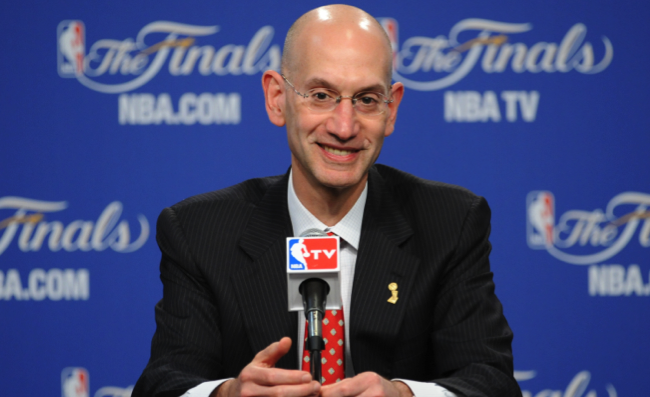Betting on sports has been formally illegal in the United States since 1992, when Congress passed PASPA, the Professional and Amateur Sports Protection Act. However, current NBA Commissioner Adam Silver has hurled the legality of sports gambling back into the spotlight. By declaring his support for legalizing sports gambling in a New York Times op-ed published in November — released the day after the NBA announced a partnership with FanDuel, one of the largest online fantasy sports websites — Silver broke with the traditional views of major sports leagues. All major sports leagues — the NFL, MLB, NHL, NCAA and, until now, the NBA — have time and again staunchly rejected all forms of sports gambling, a position designed to maintain the integrity of their respective games. Currently, sports betting is only legal in four states: Nevada, Delaware, Montana and Oregon. But Silver argues that illicit sports gambling still occurs in the remainder of the country regardless of the law, and thus this $400 billion illegal gambling enterprise should be regulated on a federal level rather than entirely ignored. While Silver presents a provocative and refreshing idea, it is one that has pitted the NBA against other sports leagues and the law itself, and that deserves careful consideration.
Silver’s announcement seems sudden, but the Commissioner’s break from sports league tradition is not wholly unexpected. Before finishing his tenure in January 2014, former NBA Commissioner David Stern, quietly opened the door for a more formalized system of sports gambling, by acknowledging in a 2009 Sports Illustrated interview that such a system was certainly a “possibility.” Stern, however, left the “slate clean for his successor” by choosing not to make any changes to the NBA’s stance on sports betting. Silver, in turn, chose to dirty the slate, first by buying a large stake in FanDuel and then by voicing his opinion on the matter.
When it comes to the legality of sports gambling, FanDuel muddies the water. Players on the site buy into various fantasy sports leagues, hoping for a large payout if they win their league. And while buy-ins to some leagues start at $1, others can sell at upwards of $25. FanDuel maintains shaky legal standing by arguing that, unlike traditional gambling, players bet against each other instead of the house, but the company still finds even this level of betting too risky to allow participation in certain states, such as Arizona, Louisiana, Iowa, Montana and Washington. With the NBA’s partnership, FanDuel will attract even more eager participants and will be able to offer enticing prizes, “including game tickets, unique NBA experiences, merchandise and memorabilia.” Now that it has partnered with FanDuel, the NBA, in addition to drawing revenue from the site, hopes to steer the site’s activities out of this legal gray area, since the league’s initial foothold in the market will ultimately yield a larger payout. Given the lucrative potential for the NBA’s partnership with FanDuel, Silver’s attempts to reopen the sports betting conversation by throwing the NBA’s power behind it is unsurprising.
Silver is calling for a total repeal of PASPA and the formation of a federal structure to regulate sports gambling. In 2011, New Jersey passed a referendum to allow sports gambling, clearing a path for casinos and racetracks to accept bets. But the following week, a US district judge blocked this law. Currently, the NFL, with the support of most sports leagues, including the NBA, is spearheading a lawsuit against New Jersey. Many call the NFL’s charge against gambling hypocritical, especially given that the NFL has recently made efforts to expand into Europe, where betting on sports is already legal and publicly regulated. By embracing sports gambling after partnering with FanDuel, Silver is seemingly trying to avoid similar charges of hypocrisy, such as those that the NFL has faced — the league would have certainly drawn criticism if it had maintained an anti-betting stance after its partnership with FanDuel. In addition to the PASPA repeal, Silver called for “mandatory monitoring and reporting of unusual betting-line movements; a licensing protocol to ensure betting operators are legitimate; minimum-age verification measures; geo-blocking technology to ensure betting is available only where it is legal; mechanisms to identify and exclude people with gambling problems; and education about responsible gaming.” Silver argues that in order for states like New Jersey to successfully offer gambling they need a national framework to follow. But while Silver’s arguments have merit and deserve discussion, he fails to consider how the NBA’s support contributes to the negative aspects of gambling. Supporting sports gambling while shifting regulatory responsibility to the government without appropriately considering the addicting and often pernicious nature of gambling makes the NBA seem greedy and eager to cash in on people willing to try their luck.
A recent John Oliver segment thrust the devastating ramifications and the deceptive success of state lotteries into the national conversation, and the idea of sports betting contains similar concerns. Up until now, the NBA and its fellow sports leagues have steered clear of appearing to make money off of “irresponsible” betters. Silver might be right in saying that a federally regulated system of sports betting may be better than the lack of regulation of a multi-billion dollar underground system that we have now, but sanctioning betting may also lead to more reckless gameplay.. One large concern arising from legalizing betting is the increased temptation to fix sports games. If sports betting is legalized, what will prevent sports players, league employees, executives or owners from purposefully throwing games in order to cash in on profitable bets? Maintaining the integrity of the game is a mainstay in the arguments against sports betting, a position that, up until now, all leagues had upheld. Adam Silver might see a fruitful opportunity in partnering with FanDuel and supporting legalization, but before American fans jump on Silver’s train, they might want to consider the malicious complications of irresponsible gambling and whether his actions will jeopardize the integrity of the game.
